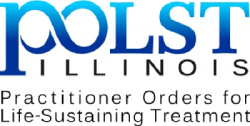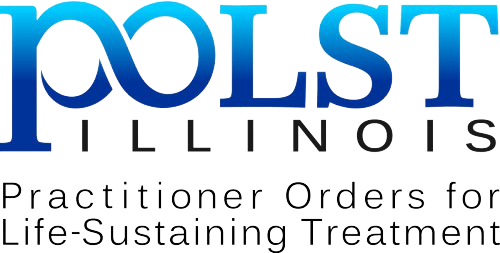INFORMATION FOR INDIVIDUALS & CAREGIVERS.
Many people believe that first-responders and EMS can follow a person's living will or directions from their medical power of attorney, but that is not the case in a typical emergency outside the hospital.
Contact Us for Information
What is POLST?
The Illinois POLST form helps seriously ill and frail, older people get the medical treatments they want and avoid the medical treatments they do not want, if there is a serious medical emergency that makes speaking to healthcare professionals impossible.
What are the benefits of POLST for me or someone close to me?
POLST encourages people at high risk of a serious medical emergency to talk with a healthcare professional about what quality of life might be acceptable near the end of life. The conversation should include:
- Patient’s diagnosis - What disease(s) or medical conditions does the patient have?
- Patient’s prognosis - What is likely to happen to the patient over time as the disease or condition changes?
- Treatment options - What treatments are available to the patient? How do they help? What are the side effects?
- Goals of care - What is important to the patient? What makes a good quality of life?
Should I discuss and consider completing
a POLST form?
After talking, the patient (or in some cases their substitute decision maker) and their healthcare professional may be able to make informed, shared decisions about what treatments the patient wants, or does not want, and put them on a POLST form.
- A POLST form is a “portable medical order” which means that emergency personnel can follow the patient’s wishes during a medical emergency outside the hospital.
- A POLST form is different from other advance directives. Even when a patient has written down or told a family member, "I do not want CPR", emergency personnel will do everything possible to try to save the patient’s life, including CPR & putting the patient on a breathing machine, unless a POLST form, placed where a first responder can find it, states, "NO CPR".
Download the POLST Form
The POLST form is available in English and several other languages. To ensure emergency personnel can understand and follow the orders, it is recommended that the POLST form be documented, signed and displayed in English. The non-English versions of the form have BOTH the English and the non-English translation on a double-sided 2-page form. The non-English sides are for educational/discussion purposes only.
Planning for the Future
When a person has a serious illness or is older and frail, the future of their health can be uncertain. These patients can’t plan for everything that might happen, but they can share what is important to them with people who matter most in their lives. Most importantly, they can choose a substitute decision maker (also known as a healthcare agent, power of attorney for healthcare, or healthcare proxy).
- A substitute decision maker is the person who speaks on behalf of the patient if they can’t make their own healthcare decisions because they are unable to speak due to an accident or illness.
- A patient’s substitute decision maker would advocate for them if there was a medical emergency and doctors needed to know what the patient would want them to do or what to avoid doing.
- All people over the age of 18 should choose a substitute decision maker even if they are not sick.
- If you do not choose your own substitute decision maker, your healthcare team will identify one for you.



